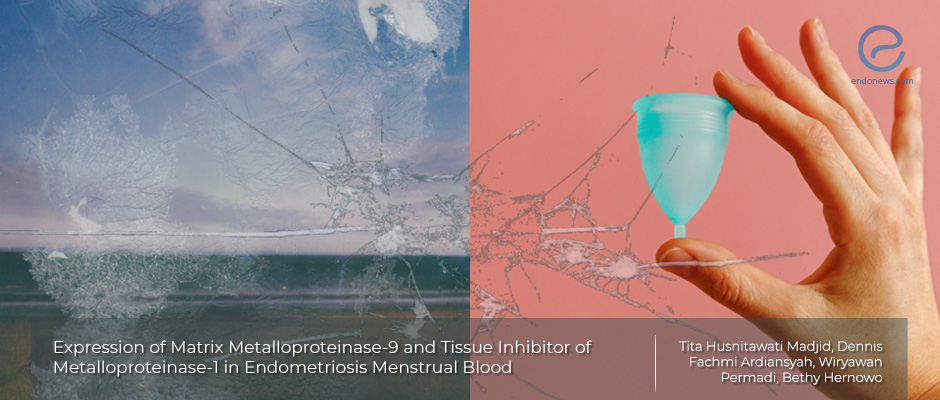Menstrual Blood Proteins for Endometriosis Diagnosis
Jun 24, 2020
Endometrial tissue proteins in the peritoneal fluids and menstrual blood to predict endometriosis.
Key Points
Importance:
- The presence of matrix metalloproteinase (MMP) and its inhibitor, tissue inhibitor of metalloproteinase-1 (TIMP-1), in shed endometrium cells of isolated from menstrual blood may help the diagnosis of endometriosis.
What's done here:
- This case-control study was performed to search for a diagnostic marker using menstrual blood.
- Sixty-eight subjects(cases: 30, controls: 38) were enrolled.
- MMP-9 and TIMP-1 proteins were assessed from the endometrial cells of menstrual blood using immunochemistry.
Data:
- Significantly strong MMP-9 staining was found in endometrial cells of menstrual blood from endometriosis patients, compared to endometrial cells of the controls.
- An increase in MMP-9 and a decrease in TIMP-1 expression in endometrial cells isolated from the menstrual blood of women with endometriosis were significant.
- Expression of MMP-9 more than 80% of cells and the expression of TIMP-1 less than 50% of endometrial cells of menstrual blood shows of high-risk for endometriosis.
Limitations
- Experimental subjects consist only of Stage 3 and Stage 4 endometriosis patients.
- Lack of studies specifically on the comparison in effectiveness between the menstrual blood test and laparoscopy, sensitivity, and specificity analyses.
Lay Summary
Endometriosis is a gynecological disorder characterized by endometrial tissue outside the uterine cavity. The backflow of menstrual blood from the uterus through the fallopian tubes is thought to be the cause of endometrial tissue growing outside the uterine cavity when it was first described. The breakdown of the extracellular matrix tissue by proteolytic enzymes is a prerequisite to endometrial tissue implantation. Matrix metalloproteinases are proteolytic enzymes that play a role in degrading the basement membranes of the endometrium during the menstrual phase. MMP-9 and its inhibitor TIMP-1 are responsible for the degradation of the extracellular matrix in biological samples. The balance of MMP and TIMP is important in physiological processes such as in menstrual cycle.
Dr.Madjid et al. examined sixty-eight women who visited the gynecology clinic in Dr. Hasan Sadikin General Hospital, Bandung Indonesia. The MMP-9 and TIMP-1 proteins from menstrual blood evaluated by immunochemistry.
The MMP-9 expression was stronger in subjects with endometriosis and seen more than >80% of cells; whereas TIMP-1 expression in women with endometriosis was lower and less widespread than the control group. These results were statistically significant.
Research Source: https://pubmed.ncbi.nlm.nih.gov/32498419/
endometriosis extracellular matrix MMP-9 proteolytic enzymes TIMP-1 stage3 endometriosis stage 4 endometriosis estrogen receptor progesterone receptor

